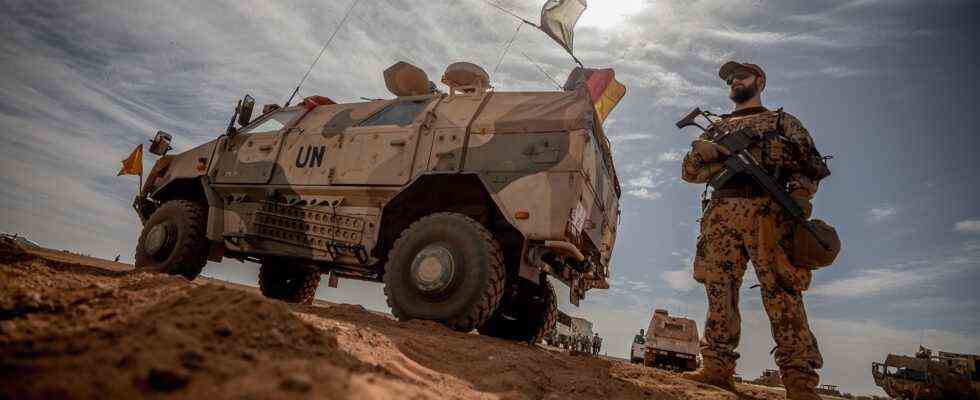analysis
Status: 13.10.2021 11:25 a.m.
Foreign and security policy played a minor role in the election campaign. But here are important decisions to be made – and in many cases the SPD, Greens and FDP are far apart. What are the problems?
The US nuclear weapons
The next federal government must commit itself to the controversial issue of “nuclear participation”. Participation means: The Americans provide the weapons within the framework of the nuclear protective shield. But in an emergency, they should bring Bundeswehr aircraft to their destination. But now the decrepit tornado jet that would have taken on this task up to now has to be replaced.
The decision on whether the successor should also be equipped with nuclear missiles was recently blocked by the SPD. Your election manifesto on nuclear deterrence is rather cloudy. Now she will have to show her true colors. Green and yellow are not at all on the same line when it comes to nuclear deterrence: The FDP is clearly committed to it, the Greens want to get rid of nuclear weapons – including those stored in Germany. However, they acknowledge that this will only be possible in intermediate steps. That leaves room for compromises, but the hurdles are high.
Armed drones
Here, too, the Social Democrats, who were divided on this issue, blocked in the GroKo years, declaring that the topic had not yet been adequately discussed. It will hardly be able to hold out for another four years. The FDP believes that drones are urgently needed to protect soldiers. For the first time, the Greens did not expressly rule this out in their election manifesto, against fierce resistance from their base.
They just want to know the application scenarios clearly outlined. As daring as the prognosis may sound, drone armament is likely to come. Yes, so that the SPD does not incur the wrath of the Bundeswehr. But there is likely to be resistance not only from the Social Democrats, but also from the Greens.
The Bundeswehr mission in Mali
When exactly is the point at which you take the emergency exit when you are on a mission abroad? This question offers potential for divisions for any coalition, especially for a traffic light. In the coming year, the two Bundeswehr missions in Mali are due to be extended. Recent reports about a possible cooperation between the coup government in the Sahel country and Russian mercenaries have fueled the discussion again.
In any case, politicians are currently looking at all foreign deployments of the Bundeswehr through a magnifying glass after the Afghanistan experience. Even if it was a social democratic-green government that decided the Afghanistan mission in 2001 (and before that in Kosovo as well): Both parties have a thoroughly pacifist basis that will not accept a continuation of this without a fight. Speaking of Afghanistan: will the FDP and the Greens, who vehemently demand a parliamentary committee of inquiry to come to terms with it, continue to want it if they co-govern?
The geopolitics
How hard or gently should Germany tackle Russia or China? The SPD and the Greens are worlds apart on this issue: Nobody defended the German-Russian Nord Stream 2 pipeline more vehemently than the Social Democrats. The Greens wanted to stop them. When it comes to dealing with China, the Greens also want a tougher pace. They think that too much attention is paid to economic interests and too little attention to human rights. The FDP is closer to green than to red on both issues.
Interim conclusion: The hurdles that pile up in security policy are completely underestimated. The fact that people talk about them so seldom doesn’t mean they aren’t there. With regard to security policy, only one thing is certain: that nothing is certain.
Europe and NATO
A ruling traffic light coalition should also regularly give the green light to increase spending on the Bundeswehr. But: Only the FDP is committed to the much discussed (and supported by Germany) NATO two percent target. The Greens are against it. The SPD is not in favor of it either, but it no longer rejected it quite as rigorously in its election manifesto as in the past. Interesting debates are programmed here.
Just like with the topic of Europe: If you can somehow find each other in defense and the goal of strengthening EU defense, there could be a crash on another core topic: namely the question of whether the EU states are allowed to take on common debts, as in the case of Corona – Relief Fund happen. The SPD and the Greens want this fund not to be a one-off action. The FDP rejects the debt union, as it is called in the election manifesto. Incidentally, in the final hours of the Jamaica negotiations in 2017, the EU was one of the points of contention on which the talks failed.
The possible staff
It is actually too early to speculate about it. Because it is not even clear who receives which ministry, there should be a traffic light. Annalena Baerbock from the Greens or Alexander Graf Lambsdorff from the FDP as possible foreign ministers are whispered as well as FDP politician Marie-Agnes Strack-Zimmermann for the defense department – should the SPD not be interested in this ministry. But an iron negotiator rule is: first the content, then the personnel. So no one has been set yet.
Foreign and security policy: stumbling block for the possible traffic light coalition
Kai Küstner, ARD Berlin, October 13th, 2021 11:03 am

